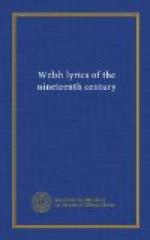The Shepherd’s Love.
Adown Llewelyn’s Cairn there creep
Cloud shadows in the failing light,
From far off dingles flock the sheep
To seek their shelter for the night.
My dog about me as of yore
Plays seek and fetch as we go home;
But, Ellen, why dost thou no more
To meet me in the gloaming come?
The heart I gave thee free from thorn
Why seek to wound with coldness,
sweet?
If lasts thine anger and thy scorn
Death’s coming I will gladly
greet.
Yet if to lose thee be my fate
My life I cannot all regret,
To see thy face doth compensate
Though weary storms await me yet.
Across thy memory’s golden gate
Let not my faithlessness appear,
Nor think upon my failings great,
Forget them—for I love
thee, dear.
But if of good I aught have done,
Oh that with eyes of kindness mark,
And let it shine—as when the sun
Spreads wings of gold to chase the
dark.
Thou rulest all my phantasy
With thy fair face and eyes divine,
The form, which in my sleep I see
Mid dreamland’s mazy fields,
is thine.
Oh if thy sweet companionship
I may not win, nor call thee wife—
Then all my future let me sleep,
And one long dream be all my life.
Baby.
His cradle’s his castle, and dainty his fare,
And all the world crowds just to see him lie there.
Whole volumes of rapture around him are heard,
But he keeps his counsel and says not a word.
His mother while hushing her baby to rest
Foretells for him all that can make a man blest.
But still he lies silent—his pride is not
stirred
For all her fond visions, he says not a word.
His father feigns anger and swears that his son
Is cross and ill-tempered, and scolds him in fun
But though he speaks loud and demands to be heard
For threats as for praises, he says not a word.
A glance at the strange world around him he throws—
Whence came he? He knows not—nor
whither he goes.
Vague memories of angels within him are stirred,
Too deep for mere speech—so he says not
a word.
Yet answer there comes and as clear as can be,
In his eyes bright and sparkling his soul you can
see.
To all that is said of him, all that is heard
He looks his reply, though he says not a word.
CALEDFRYN.
William Williams was born at Denbigh February 6th, 1801. A weaver by trade, he showed signs of fitness for the ministry, was sent to Rotherham College, and was ordained minister of the Independent body at Llanerchymedd in 1829. He died at Groeswen, Glamorganshire, March 29, 1869. He published a volume of his poems in 1856, “Caniadau Caledfryn.”
The Cuckoo.
Dear playmate of the verdant spring,
We greet thee and rejoice,
Nature with leaves thy pathway decks,
The woodlands need thy voice.




